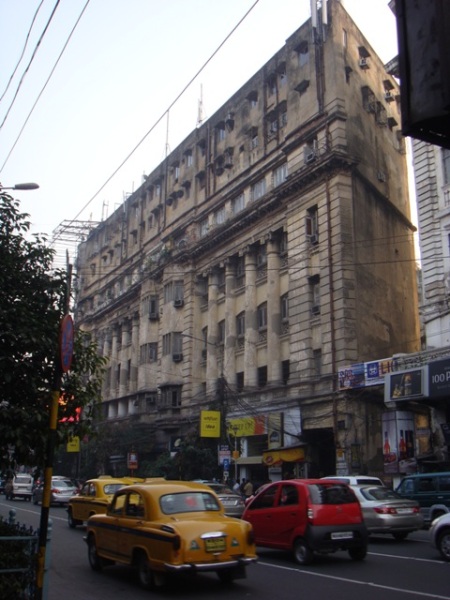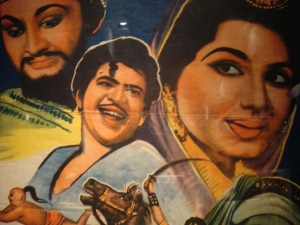Ami chini go chini tomare o go videshini
Tumi thaako shindhu paare o go videshini
(I know you, I do, oh stranger from distant lands
You belong to the place beyond the Indus river, o stranger from distant lands)
These are the opening lines of a rather lovely example of Rabindra Sangeet, immortalized by Satyajit Ray in his 1964 classic Charulata, sung therein by Kishore Kumar, and picturised on the boyishly charming Soumitra Chatterjee – and I must confess the words rang in my ears in all their foreign sweetness as I stepped out of the confines of the airport and into the city of Kolkata nee Calcutta, capital of West Bengal, and witness to the birth and bloom of countless historical figures, ideas, and movements. From Swami Vivekananda and Ram Mohan Roy, Rabindranath Tagore and Sarat Chandra Chattopadhyay, to Ray and Ritwik Ghatak, Bimal Roy and Hemant Kumar, and the Messrs. Burman Sr. and Jr. – Kolkata has been the nucleus of the Bengali Renaissance of the past two centuries. And the city wears that crown with little trace of the unease Shakespeare assigned to royal noggins. Indeed, despite the grimy appearance, the pollution, the confusing, typically South Asian politics, and the alarming ways of the traffic, there is a nonchalant grace about the place; here meet worlds old and new in a warm embrace, and together they upstage India Shining, like a suave, roguish, strong silent type scoffing amusedly at the clumsy, attention-seeking antics of a brat with his slip on display.
The Apeejay Kolkata Literary Festival, of which I was an invitee, is not your typical sexy gathering of trendy pen-pushers and Instagram hounds. Instituted by the highly respected Apeejay Surrendra Group, whose myriad ventures include the popular Oxford Bookstore on Kolkata’s historic Park Street, the AKLF is a respite from the other somewhat cynically motivated cattle-calls, with genuinely interesting and challenging panel discussions and, perhaps most welcome of all, the gumption to acknowledge that writers do not exist in a vacuum, that their work is shaped and informed by the world around them, and hence the Festival’s choice to include other elements of India’s socio-cultural landscape in the fray, such as cinema, theatre, music, photography, food, and political satire.
It was a hundred years ago, in 1913, when Dadasaheb Phalke directed Raja Harishchandra, the first indigenously produced Indian film, thereby laying the foundations of a national cinema of the sub-continent, and the opening sessions of the AKLF paid homage to the centenary year of Indian cinema, including a brilliant keynote address by legendary filmmaker Shyam Benegal, delivered against the dramatic backdrop of the Victoria Memorial building. It was an unusually chilly evening but a spellbound audience braved it without complaint as Mr. Benegal spoke about the depiction of Muslims and Muslim culture in Hindi films. The celluloid theme was carried further in the form of Maya Mahal, an enchanting exhibition of old film posters, on display for the first time, from the private collection of Priya Paul, a senior member of the Apeejay Group.
At some point in the middle of it all I found myself in a fairly daunting position, seated alongside Mr. Benegal, acclaimed new filmmaker Onir(My Brother Nikhil, Bas Ek Pal), and revered actor Dhritiman Chatterjee, on a panel discussion on alternate discourses in Indian cinema. The session was moderated by author and journalist Jai Arjun Singh (whose wonderful book about the cult film Jaane Bhi D Yaaro sits in a dog-eared state on my bookshelf) and went by in a flash, with a very receptive audience unafraid to ask questions and express their appreciation at the replies.
At venues ranging from the snazzy Park Hotel, the elegant National Library, and the famous Max Mueller Bhavan, to the historic Lascar Monument, one was treated to some truly engrossing sessions with people from all parts of the world. Some were already well-known – William Dalrymple launched his latest, The Return of the King – while others bound to be so in days to come. Yasmin Premji’s readings from her maiden novel, Days of Gold and Spices, indicated a work of quietly dazzling power. Elsewhere, writer s Farah Ghaznavi, Kenize Mourad, and Jael Silliman discussed issues of image and identity in literature vis-à-vis women in Asia.
Amidst the dire rumblings along the LOC, the Festival carried on valiantly, even as it came time to showcase a performance by Karachi’s very own National Academy of Performing Arts Repertory. Titled When Ghalib Met Manto – Ek Guftagu, the experimental piece was accompanied by live renditions of Ghalib’s poetry by NAPA alumni, and was well-received by the large crowd gathered in the grounds of the magnificent St. John’s Church. NAPA’s performance was preceded by dramatized readings in English and Bengali by renowned actors Tom Alter and Barun Chanda, respectively, from Rabishankar Bal’s Dozakhnama (and its English translation by Arunava Sinha) – which has been described as a biography of Manto and Ghalib and a history of Indian culture rolled into one.
The proceedings of the festival aside, Kolkata is also a city with ample character, its narrow roads and wide pavements home to quaint structures seemingly preserved from a time long ago. Sitting at Flury’s, the city’s oldest café, I eavesdropped on conversations being carried on in the impossibly sweet-sounding Bengali language. Just as delectable are the region’s famous desserts, sandesh and mishti dhoi chief among them, which I sampled with relish at the insistence of R.D. Burman biographer Anirudha Bhattacharjee, who was also kind enough to sign my copy of his book, and then helped fulfill one of my fan-girl dreams by leading me and fellow Burman enthusiast Faiza on a ‘pilgrimage’ to the Burman home in South End Park. We clicked away with our cameras in hushed awe, while Mr. Bhattacharjee got us cups of tea from the khoka next to the gate to help us calm down. He then revealed some details about his forthcoming Bollywood related book, but swore us to secrecy, on pain of death.
Flury’s, the city’s oldest café, I eavesdropped on conversations being carried on in the impossibly sweet-sounding Bengali language. Just as delectable are the region’s famous desserts, sandesh and mishti dhoi chief among them, which I sampled with relish at the insistence of R.D. Burman biographer Anirudha Bhattacharjee, who was also kind enough to sign my copy of his book, and then helped fulfill one of my fan-girl dreams by leading me and fellow Burman enthusiast Faiza on a ‘pilgrimage’ to the Burman home in South End Park. We clicked away with our cameras in hushed awe, while Mr. Bhattacharjee got us cups of tea from the khoka next to the gate to help us calm down. He then revealed some details about his forthcoming Bollywood related book, but swore us to secrecy, on pain of death.
As I said ‘pore dakhaa hobe’ to Kolkata and got on the flight to Delhi, I felt foolishly sentimental, for the city had satisfied to a great extent my penchant for old-world nostalgia. Having arrived there with Kishore echoing in my head, it was only fitting that I also departed with him singing on my ipod:
Shehron mein se shehr suna
Shehr Kalkutta
Gali gali bhool bhulaiyyan
Bhool gaya rasta
Hum kho gaye
Des mein pardesi ho gaye!
(A city among cities
I’d heard
is the city Calcutta
where every lane is a labyrinth
it’s easy to lose your way
And now I’m lost
an outsider in my own land!)

